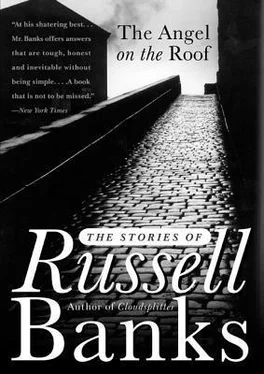You have been seated on a straight-backed chair in the center of the stage. A few feet in front of you, the Reverend Doctor Woolsey reads at the lectern from his prepared introductory speech. You watch his broad back, his speckled hands, his rising fluff of white hair. The thick tube of fat at the base of his skull contracts and hardens, and the Reverend Doctor lifts his gaze to the heavens so as more adequately to praise the poet, Edgar Poe, author of “The Raven.” You. Who cannot remember your mother. In your dreams she appears with her back to you, her arms outstretched before her. She ignores your call of, Mother! Mother! It is I, Edgar Poe the poet! But she does not flee or otherwise remove herself from you. She stands there in a white dress, as if at a lectern, with her arms outstretched, her gaze lifted heavenward, as if more adequately to praise her son, or as if to pray for permission for him to join her. For, without permission, you cannot join her, you may not move your feet, you may not take a single step toward her. It is as if you are bad, a bad boy, bad little boy. That is how she appears in your dreams of her and how you also appear there. A moribund tableau vivant, a frieze cut in a wall of darkness. Not a conscious memory, though. When awake, you try to remember your mother, as you do now, and you remember nothing, and since no mind can picture nothing, you remember Mr. Allan and the tobacco warehouses, the canal alongside the James River, your cousin Virginia and her mother. You recall your room at the college in Charlottesville, the parade ground at West Point, and then your half-empty bottle of Madeira on the spindly table offstage right. You remember your white handkerchief, slightly spotted with the wine wiped from your chin, now tucked neatly into your breast pocket to hide the purple stains from view of the audience, who can see you clearly up here stage center. Someone in that audience is coughing, nervous, repeated coughs coming from her throat, habitual and not the consequence or sign of illness. It will have a slight, negative effect on your recitation, for, unless you can pick up the rhythm, the pattern of her coughing, and can arrange always to be speaking at the same time, she will succeed in coughing while you are silent between stanzas or when you pause momentarily for dramatic effect, and it may have the effect of silencing you completely. You listen closely for the pattern of her coughs, and, surreptitiously, you hope, slip your watch from your vest pocket and study its face, while the Reverend Doctor Woolsey continues his lengthy introduction of the poet Edgar Poe and the unseen woman coughs, then coughs again, and, after thirty-two seconds, yet again. You calculate that if you commence reciting the poem seventeen seconds after a given cough, she will cough again in the middle of the third line and after that at the middle of every twelfth line (the fifteenth, twenty-seventh, thirty-ninth, et cetera) and at the end of every twelfth line from the beginning (the twelfth, twenty-fourth, thirty-sixth, et cetera). This particular spacing will minimize the effect of her coughing, will make it only slightly negative. But negative just the same, for it means that you will have to run each of those twelfth end-stopped lines rapidly into the following line, which will blur your every sixth rhyme and somewhat diminish the dramatic structure of the poem. As for its effect on the raven’s harsh refrain, you can only hope that the audience is sufficiently familiar with the poem to hear with its collective ear the croak of Nevermore in the very coughing of the woman, as it were, as if you Edgar Poe the poet said nothing, as if you merely mouthed the words, for the raven, for the unseen woman in the audience coughing, for the woman in your dream, for your mother dying in an attic room in Richmond, Virginia, your mother, whose consumptive cough and groans and finally her shrieks are muffled into silence by the women in the kitchen wrapping your head with a scarf so that you cannot hear your mother dying, will not remember this awful time in your life, and will not remember your mother.
You return to the hotel, sober and alone, exchange greetings and complaints about the midsummer heat with the desk clerk, and climb the carpeted stairs to your room on the second floor. The recitation went well. You overcame the woman’s coughing interruptions just as you’d planned, and at the end the audience rose and applauded with gratitude. A few women near the front, when they rose from their seats to thank you for reciting your “magnificent and profound” poem, could be seen with tears washing their cheeks. Afterwards, when you departed the stage, you discovered that someone, a janitor probably, had removed your half-emptied bottle as a blessing and a sign, and later, at the Reverend Doctor Woolsey’s gathering for the literary ladies and gentlemen of Richmond, Virginia, you declined the sherry and asked for water, a glass of cool, clear water with a bruised leaf of mint dropped into it. And so now you arrive at your hotel room sober. But late, past midnight, for, because tonight you were sober, you spoke to the ladies and gentlemen with a lucidity driven by logic that astonished them and made them beg you to stay and continue to mystify, enchant, and bewilder them. One is always amazed by what is most rational, you muse as you enter your darkened room. The irrational, even though it makes one feel helpless, out of control, childlike, seems more “natural” to one. You light the lamp, sit on the bed, and slowly remove your shoes. You think: And one is right to believe in the “naturalness” of unreason. And right to be amazed by what is most rational, to be simultaneously shocked and relieved by a person who presents himself as demystification, disenchantment, and clarity personified. Both right and good —for those are the modern vices we set against the ancient virtues of faith, hope, and charity!
You hold your head in your cool palms. Oh my! Oh my! To aspire to purge one’s mind and all its manifestations of every taint of unreason — such an aspiration must be blasphemy ! To be pure reason, to be self-generating, to be unable to remember your mother — is to be a god ! Is that why you can’t remember your mother’s face, her smell, her touch, her voice? Is this painful absence the necessary consequence of your o’ervaunting ambition? Evil. You say the word aloud, over and over. Evil. Evil. You draw off your socks and your trousers, your jacket, vest, shirt, and necktie, your underclothes, all the while murmuring, Evil, evil, evil .
Until at last you are naked, the poet Edgar Poe, author of “The Raven,” naked in the dim light of a hotel room in Richmond, Virginia. You peer down at your toes, bent and battered, each toe topped with a thin wad of black hairs. Your knees, knobbed, the skin gray and crackled, and your gaunt thighs, your genitals, dry, puckered, and soft, half-covered with a smoky patch of hair. You look at your drooping belly and your navel, that primeval scar, and your breasts, like two empty pouches. You study your hands, twin nests of spiders, and your thin arms, the moles, freckles, discolorations, fissures, hairs, and blemishes, and your gray, slack skin.
You try to look at your face — but you cannot. There is a dresser mirror across from you to your right a few paces, but that will not do. You want to look upon your face directly. And you cannot. You know that if you look directly at your own face, you will be able to remember your mother’s face. And then her touch, her smell, her voice. You touch your face with your fingertips, rubbing them across nose, lips, eyes, ears, and cheeks. You can get the facts of your face, but you cannot look upon it directly. Just as you can get the facts of your mother’s life, from the memories of the women, those young women now old, but you cannot remember her directly yourself. Is that why you have for so many years aspired to what is evil? Because it was easier for you than to become a “natural” human being, easier than remembering your mother? Easier to be evil than good? You are weeping silently. Which is it? Are you unable to remember your mother because you are evil and persist in blasphemy, or are you evil and persist in blasphemy because you cannot remember your mother? Which? For one must be a cause, the other the effect. Which the cause? Which the effect? Why are you weeping? Why are you naked? Why are you the poet Edgar Poe author of “The Raven”? Why are you not a particular, remembered, and memorialized mother’s son?
Читать дальше












